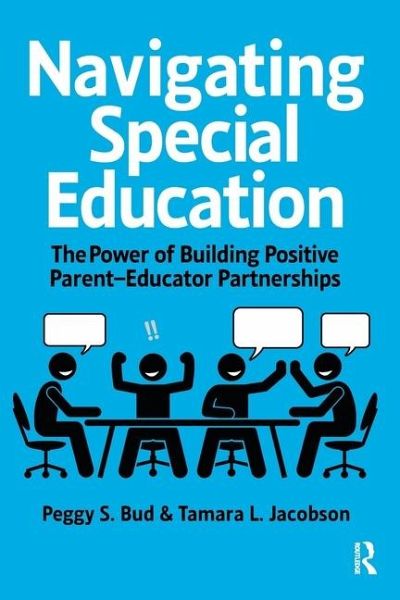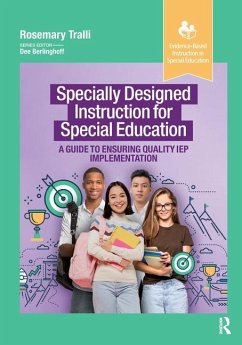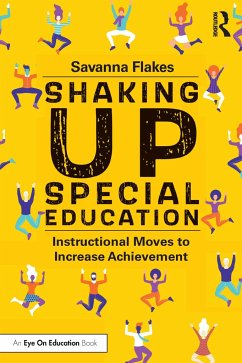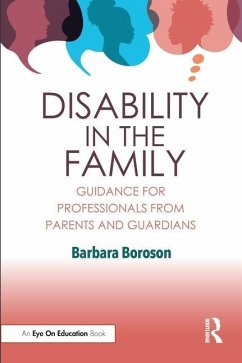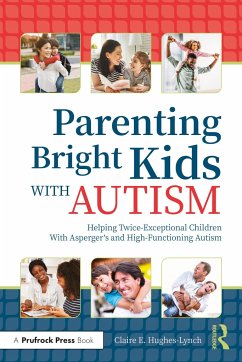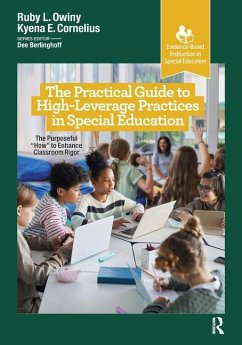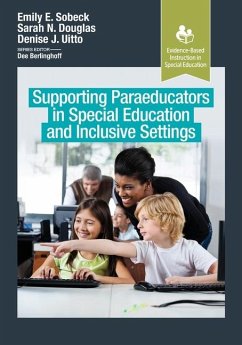Navigating Special Education
The Power of Building Positive Parent-Educator Partnerships
Versandkostenfrei!
Versandfertig in 1-2 Wochen
Weitere Ausgaben:

PAYBACK Punkte
17 °P sammeln!




This timely and innovative roadmap for parents, educators, and administrators highlights the importance of effective communication methodology, appropriate correspondence, and data collection recommendations. Effective communication is often missing from the IEP teamâ s conversation.
Peggy S. Bud is a licensed speech-language pathologist and school administrator with more than 30 years of experience in public education. She founded Speaking Skillfully to provide consultation services to families of children with disabilities and to help business professionals bridge the communication gap. As a communication coach, educator, speaker, and author, she utilizes her background in cognitive neuroscience and language to teach effective communication strategies. Peggy serves as a vital voice for families and facilitates collaborative special education teams, putting her extensive knowledge from her time as a special education administrator to use as she assists both sides of the IEP team. She advises families on how to successfully advocate for their child by having data-driven conversations and building strong home and school partnerships. Additionally, she provides professional development opportunities to educators, teaching them how to effectively communicate with parents, write strong educational plans, and differentiate their instruction to address the needs of all students. In addition to her private consulting practice, Peggy is the Community Outreach Director of Kids Are Talking, Director of Recruitment for The Financial Executives Consulting Group, a member of the Leadership Team of The Financial Executives Networking Group, serves on the Board of Directors of Bridge Academy (a charter school in Bridgeport, Connecticut), and Earthplace, a non-profit organization where science, conservation, and education meet. She holds a Bachelor of Science from Indiana University, as well as a Master's of Science and sixth-year Certificate in Educational Leadership from Southern Connecticut State University. Her motto is: It's more than what you say, it's how you say it. Visit her website: www.PeggyBud.com. Follow her on linkedin.com/in/peggy-bud-8404b524 or on Facebook at Speaking Skillfully. Tamara L. Jacobson has more than 30 years of experience advocating for children throughout the United States.Tamara previously taught English as a second language (ESL), theater arts, history, public speaking, and language arts for more than 18 years. She served as the head of curriculum and instruction for 5 years and as supervisor, then as assistant principal for 4 years. She holds lifetime and praxis certificates in administration and supervision K-12, ESL/bilingual education/dual language K-12, history K-12, communication arts (public speaking, debate, forensics) K-12, early childhood education PreK-3, and elementary education K-6. Tamara worked as an educational consultant for Total Training Solutions, Ask the Educators, and East Coast Special Needs Advocacy and is currently the executive director of East Coast Educational Consulting LLC. She has conducted hundreds of workshops for teachers, teacher-aides, therapists, administrators, boards of directors, parent associations, and private community organizations. Tamara is the mother of three daughters, one of whom lives with severe significant physical and cognitive developmental delays.Combining her interests in education and theater, Tamara has an acting and theater arts MFA in Directing. She has owned and directed Stars Theater and Dance Academy for many years. In 2011, she was profiled in Cambridge's Who's Who as a successful businesswoman. Tamara holds a post-graduate certificate in Administration & Supervision with a concentration in Urban Studies. Currently, she is a doctoral candidate in Learning & Organizational Change at Baylor University. She is expected to graduate in May 2023. In 2012, Tamara graduated from the "Partners in Policymaking in the State of NJ" program, a nonpartisan advocacy group that looks at legislation affecting marginalized communities. She is affiliated with the following organizations and conferences: American Education Research Association, Council for Exceptional Children, Academy for Educational Studies Critical Questions in Education Symposium, Carnegie Project on Special Education Doctorate, Southeastern Universities Graduate Research Symposium, and Baylor Education Research Conference. Tamara has authored four published pieces: Navigating Special Education, A Different Kind of Wonderful, Understanding the Andragogical Learning Experiences of High School Students With Severe Autism Spectrum Disorder (ASD) During the COVID-19 Pandemic, and Sofia Makes Her Mark.
Produktdetails
- Verlag: SLACK Incorporated
- Seitenzahl: 298
- Erscheinungstermin: 15. März 2023
- Englisch
- Abmessung: 229mm x 152mm x 16mm
- Gewicht: 430g
- ISBN-13: 9781638220909
- ISBN-10: 1638220905
- Artikelnr.: 67617161
Herstellerkennzeichnung
Libri GmbH
Europaallee 1
36244 Bad Hersfeld
gpsr@libri.de
Für dieses Produkt wurde noch keine Bewertung abgegeben. Wir würden uns sehr freuen, wenn du die erste Bewertung schreibst!
Eine Bewertung schreiben
Eine Bewertung schreiben
Andere Kunden interessierten sich für




